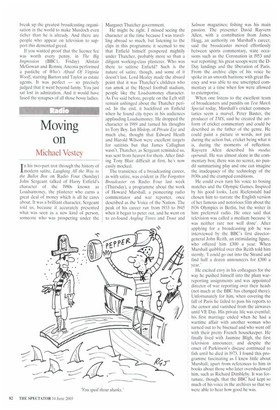Moving on
Michael Vestey
In his two-part trot through the history of modern satire. Laughing All the Way to the Ballot Box on Radio Four (Sunday) John Sergeant talked of Harry Enfield's character of the 1980s known as Loadsamoney, the plasterer who earns a great deal of money which is all he cares about. It was a brilliant character, Sergeant told us, because it accurately presented what was seen as a new kind of person, someone who was prospering under the
Margaret Thatcher government.
He might be right. I missed seeing the character at the time because I was travelling abroad so much, but listening to the clips in this programme it seemed to me that Enfield himself prospered mightily under Thatcher, probably more so than a diligent working-class plasterer. Who was there to satirise Enfield? Such is the nature of satire, though, and some of it doesn't last. Lord Healey made the absurd point that it was Thatcher's children who ran amok at the Heysel football stadium, people like the Loadsamoney character. As I've said before, people on the Left still remain unhinged about the Thatcher period. In the end, it backfired on Enfield when he found city types in his audiences applauding Loadsamoney. He dropped the character in 1989 and turned his thoughts to Tory Boy. Ian Hislop, of Private Eye and much else, thought that Edward Heath and Harold Wilson were excellent targets for satirists but that James Callaghan wasn't. Thatcher, as Sergeant reminded us, was sent from heaven for them. After finding Tony Blair difficult at first, he's now easily mocked.
The transience of a broadcasting career, as with satire, was evident in The Forgotten Broadcaster on Radio Four last week (Thursday), a programme about the work of Howard Marshall, a pioneering radio commentator and war reporter, once described as the Voice of the Nation. The peak of his career ran from 1933 to 1945 when it began to peter out, and he went on to co-found Angling Times and Trout and Salmon magazines; fishing was his main passion. The presenter David Rayvern Alien, with a contribution from James Hogg, an authority on Marshall's career, said the broadcaster moved effortlessly between sports commentary, state occasions such as the Coronation in 1953 and war reporting; his great scoops were the DDay landings and the liberation of Paris. From the archive clips of his voice he spoke in an smooth baritone with great fluency and was able to use unscripted commentary at a time when few were allowed to extemporise.
When one listens to the excellent team of broadcasters and pundits on Test Match Special today, Marshall's cricket commentaries seem a marvel. Peter Baxter, the producer of TMS, said he created the artform of cricket commentary and could be described as the father of the genre. He could paint a picture in words, not just during the action but, cricket being what it is, during the moments of reflection. Rayvern Allen described his modus operandi. He was almost alone in the commentary box; there was no scorer, no pundit summarising play and one can imagine the inadequacy of the technology of the 1930s and the cramped conditions.
He could even turn his voice to boxing matches and the Olympic Games. Inspired by his good looks, Leni Riefenstahl had chosen him to narrate the English version of her famous and notorious film about the 1936 Olympics in Berlin, but the writer in him preferred radio. He once said that television was called a medium because 'it was neither rare nor well done'. After applying for a broadcasting job he was interviewed by the BBC's first directorgeneral John Reith, an intimidating figure, who offered him £300 a year. When Marshall quibbled over this Reith told him sternly, 'I could go out into the Strand and find half a dozen announcers for £300 a year.'
He excited envy in his colleagues for the way he pushed himself into the plum warreporting assignments and was appointed director of war reporting over their heads (not much at the BBC has changed there). Unfortunately for him, when covering the fall of Paris he failed to pass his reports to the censor and vanished from the airwaves until VE Day. His private life was eventful: his first marriage ended when he had a wartime affair with another woman who turned out to be bisexual and who went off with their pretty French housekeeper. He finally lived with Jasmine Bligh, the first television announcer, and despite the onset of Parkinson's disease continued to fish until he died in 1973. I found this programme fascinating as I knew little about Marshall, apart from references to him in books about those who later overshadowed him, such as Richard Dimbleby. It was fortunate, though, that the BBC had kept so much of his voice in the archives so that we were able to hear how good he was.


































































































 Previous page
Previous page